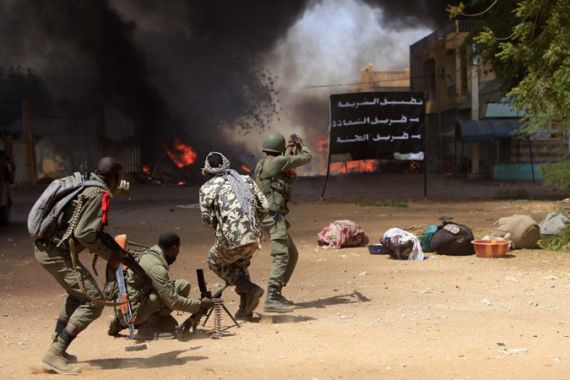Violent protest as Northern Mali talks begin
Thousands take to the streets in Gao, burning cars and the mayor’s house, over alleged tampering with delegates list.

Thousands of residents in Mali’s northern city of Gao have fought street battles with police and torched the mayor’s house during a protest over talks aimed at healing divisions in the north.
Friday’s demonstration broke out as representatives gathered at the opening ceremony of the Conference on Northern Mali in the capital, Bamako, on promoting peace and equality among the marginalised populations of the country’s vast desert north.
Police fired tear gas at the protesters who threw rocks and torched cars. The protesters accused the government of making last-minute changes to the list of delegates for the talks in Bamako, according to residents.
“Youths started burning tyres and barricading streets. The mayor’s house was torched and three cars were burnt in front of his office,” Gao resident Boubacar Maiga said.
|
|
| Al Jazeera’s Mohamed Vall reports from Northern Mali, where Tuareg rebels are still willing to fight for independence |
“We have things to say and there are officials who do not want to hear us in Bamako,” said Aliou Toure, another resident who took part in the protest.
Mali’s reconciliation minister Cheick Ouamar Diarrah said the change in the list was a misunderstanding, and delegates chosen by the people would join the conference.
Gao was a stronghold of rebel groups who took over the north of the country in 2012 before France sent troops to Mali in January to push them back.
Residents of the town have taken to the streets in recent weeks to protest against hardship and insecurity as the town has come under rocket attacks from rebels hiding in the surrounding desert.
Marginalised groups
Launching the conference in Bamako, President Ibrahim Boubacar Keita said the government would be devolving “more power” to the regions, to “accelerate their development”.
“Armed groups and movements have a strong desire for dialogue. We are also for dialogue. Apart from autonomy and independence, everything is negotiable within the republic,” he said.
Mali’s northern desert region makes up two-thirds of the territory but poverty is widespread among its Tuareg, Arab, Songhai and Fulani populations and basic infrastructure such as clean water, electricity, schools, hospitals and roads is sparse.
In a separate development on Friday, the Netherlands said it would send four apache helicopters and about 380 troops to boost a UN-led peacekeeping mission trying to stabilise the West African nation.
“Northern Mali is threatening to become a place where terrorists are freely trained,” Dutch Prime Minister Mark Rutte said as he announced the deployment.